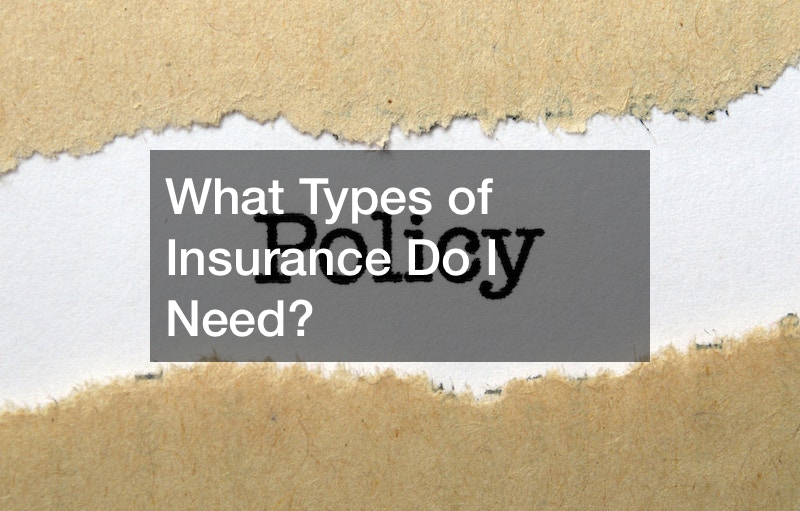
Insurance offers financial support during the times when we need it most. In the wake of an accident, the payout from an insurance claim can help you get back on your feet. With the sheer number of available insurance policies, it can be difficult to figure out which ones will help you the most. The information in this article will shed more light on that matter. Figure out how to portion your insurance budget using the details provided here!
1. Auto
Let’s start with the type of insurance that most people are likely familiar with, and that is none other than auto insurance. Car insurance is required in nearly all states. According to MarketWatch, the only exceptions to that rule are New Hampshire and Virginia. Motorists in New Hampshire and Virginia must still prove they can cover potential losses in an accident, so one can argue that getting insurance remains the simplest option.
The most basic component of an auto insurance plan is liability coverage. Liability coverage does not offer payouts to the policyholder. Instead, this coverage comes into play if you caused an accident that led to bodily injuries or property damage. The minimum liability coverage requirements vary from state to state, so make sure you’re clearing them before finalizing your purchase.
Your auto insurance plan may also include comprehensive and collision coverage. Unlike liability coverage, these two policies allow the insured to receive compensation directly. Policyholders can file an insurance claim for either comprehensive or collision coverage to pay for auto body repair. Collision covers damage from crashes, while comprehensive coverage protects against fire, theft, and vandalism.
Personal injury protection (PIP) is another policy that can help you out of a tough spot. You can use this policy to cover medical bills following an accident. Depending on your policy, PIP may even provide financial support if you have to miss work due to injuries.
Don’t forget to ask about uninsured and underinsured motorist coverage when you purchase your auto insurance plan. Those policies can be lifesavers if you are in an accident with an irresponsible driver. You can file an insurance claim against your uninsured or underinsured motorist coverage to cover your medical and repair-related expenses.
2. Health

Next up, let’s turn our attention to health insurance and the protection it can provide. Health insurance is designed to make essential healthcare expenses more accessible and affordable. You don’t have to spend years saving up for treatment because your insurer can step in and help shoulder the cost.
So, what does a health insurance claim cover? For starters, your policy covers doctor consultations. Go in for a check-up whenever you need to without worrying about the cost of doing so. Your policy will also cover the laboratory services and prescription drugs your doctor may deem necessary.
Health insurance doesn’t just cover your visits to the doctor. It will also cover your child’s healthcare. Don’t hesitate to file an insurance claim if your child needs treatment. You can also count on your policy to cover several aspects of newborn care.
This type of insurance is arguably most valuable during an emergency. Your health insurance plan can make your emergency expenses significantly lighter. If you have to stay in the hospital for additional treatment or surgery, your plan will also cover that.
Are you currently dealing with a chronic disease? Health insurance plans can help you manage it better. Receive the long-term medical support you need to handle that condition.
Some health insurance policies provide in home healthcare. They also allow policyholders to access rehabilitative services. You can schedule a physical therapist appointment after coordinating it with your insurer.
Let’s not gloss over the fact that these insurance plans now cover mental health issues. Work with your insurer to set up mental health counseling and receive valuable support from a trusted professional. Those counseling sessions can help improve your quality of life and address deep-seated issues.
3. Dental
A health insurance plan usually will not cover your dental care needs. An exemption may be granted if you need dental care to address a related health condition, but those instances are rare. We should note that a health insurance plan already covers visits to a pediatric dentist. Still, you will have to purchase a dental plan separately to ensure your teeth and gums stay healthy as you age.
So, is getting a dental insurance plan worth it? Considering the benefits it provides, it’s hard to argue against purchasing this type of insurance. Having the option to file an insurance claim for dental care will allow you to address pressing health issues with greater urgency.
A bacterial infection can lead to the development of a dental abscess. That dental abscess can cause intense pain, increased sensitivity, and foul-smelling breath. Abscesses must also be treated immediately, so you may need an emergency extraction. Your insurance can cover that procedure.
Dental insurance plans can pay for other essential forms of treatment. Thanks to your dental insurance, you can get a root canal or a tooth filling. If the type of treatment you need is considered essential from a healthcare perspective, chances are your dental plan will cover it.
Orthodontic devices are more of a gray area. You may receive coverage for dentures, but the policy may not honor claims for adult braces. Make sure your dental plan covers your needs, and feel free to shop around if you’re not getting all the terms you want.
Regular check-ups and cleanings are also included in dental plans. They should also be available for everyone in your household if you secure a family dental policy. It’s easier to save money on a family dental service plan if you purchase insurance beforehand.
4. Pet

Caring for a pet is a major responsibility. You’ve accepted that precious animal into your home, and it’s your job to ensure they receive the food and attention they need. Of course, your animal companion will need more than that to live a long and happy life. Just like other members of your family, pets also deserve quality healthcare.
Unfortunately, many pet owner‘s are woefully unprepared to take on the expenses related to veterinary care. They hold off on taking their pet to a veterinary hospital because they don’t have the funds necessary to pay for treatment. You don’t have to end up in that difficult position. By picking up a pet insurance plan today, you can secure expert care for your animal companion no matter when the need arises.
A pet insurance claim can be helpful in a variety of ways. First off, you can rely on that plan to cover common pet illnesses. Use a claim to find out why your pet is suffering from diarrhea and vomiting and treat the underlying condition causing those symptoms.
Pet insurance becomes especially valuable as your furry friend grows older. That’s mainly because those plans cover chronic conditions such as arthritis and cancer. You can file a claim to pay for your pet’s diagnostics and hospitalization. The plan can also help if your pet needs physical therapy for their chronic condition.
Our furry friends are also susceptible to injuries such as broken bones and torn ligaments. Occasionally, their curiosity can also get the best of them and cause them to ingest items and substances they shouldn’t. In either case, you can expect your insurer to step up and cover your pet’s treatment costs.
5. Event
Event insurance may not seem as important or valuable compared to some of the other plans included in this article. Once you grasp how event insurance works, you’ll quickly realize that’s not the case. It may even be the sole reason why a canceled event doesn’t end up costing you a fortune.
Event insurance may even be a required purchase for you. Certain venues may require you to buy event insurance before you can rent them out. You may have to give up on renting your dream wedding venue if you refuse to take out event insurance.
You can file an insurance claim if your event is canceled. The policy can cover the costs of rescheduling your event at the same venue. Your policy can offer compensation if you lose deposits because your caterers and photographers cannot work on your new event date. Taking out event insurance ahead of time can save you from the enormous losses typically caused by a cancellation.
Note that a standard event insurance policy also provides liability coverage. Liability coverage can take effect if accidents occur during your event. Your insurer can pay for any property damage caused by that accident. You can also rest assured that your injured guests will receive the care they need because of your policy.
It would be best to purchase your event insurance as early as possible. Insurers don’t cover all types of events, so you should seek clarification before moving forward with your plans. Lock down your event insurance as early as possible and set your plans without worrying about the massive financial ramifications of a canceled event.
6. Home

Your home is likely your most valuable asset. Given how many resources you’ve likely poured into your home, keeping it protected using insurance makes a lot of sense. Every homeowner should take the time to discuss purchasing a policy from their insurer because the potential losses that could stem from an accident or natural disaster are too great to ignore.
House fires and hurricanes can be devastating. They can significantly damage your home and the items you keep there. Because you have insurance, you don’t have to start from scratch if your home is affected by one of those disastrous events. You can file an insurance claim and quickly recoup compensation for your losses.
Is your home located in a neighborhood with a questionable reputation? If so, that’s yet another reason why you should strongly consider purchasing homeowners insurance. These policies can also protect against acts of vandalism. Securing protection against vandalism is even more important if you spend a lot of time away from home.
We should point out that home insurance policies can also save you from financial losses if someone has an accident on your property. A guest who slips on an icy patch on your driveway may angrily blame you for what happened. Instead of stressing out about a potential lawsuit and the consequences of that, you can rely on your insurer. They can cover the accident victim’s medical expenses, and you can focus on other matters.
7. Commercial

Last but not least, you should also look into getting commercial insurance. Commercial insurance differs from the other policies we’ve already discussed because it is more than just one policy. There are several forms of commercial insurance, and you can customize your plan based on your business’s specific needs. That said, there are two particular types of commercial insurance that are often required.
The first type of commercial insurance most business owners are required to purchase is workers’ compensation. State rules regarding workers’ compensation vary, but business owners are usually required to purchase this form of commercial insurance as soon as they hire their first employee. Business owners can avoid enormous financial losses by leaning on workers’ compensation.
You may also be required to purchase commercial auto insurance before conducting business. Commercial auto insurance is a requirement for any business that uses a vehicle for any aspect of its operations. A single accident could ruin your business if you don’t have commercial auto insurance.
Although workers’ compensation and commercial auto insurance are the only plans you may be required to purchase, other useful policies are also available. General liability insurance can cover any patrons who suffer injuries on your property. Meanwhile, cyber insurance can protect you against attacks launched by bad actors online.
Insurance is a safety net that can grant comprehensive protection against all kinds of threats. Filing an insurance claim may be the key to escaping an increasingly desperate situation. You’ll never regret investing in insurance.



